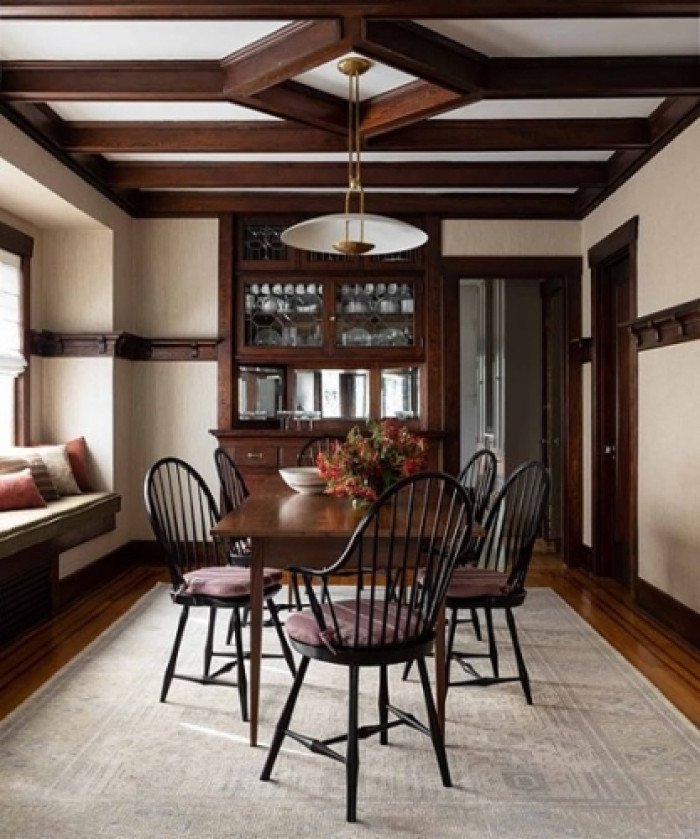10 Ways to Add Authentic Craftsman Interior Design to Your Space
Explore the timeless charm of Craftsman interior design, we’ll guide you through everything from rich wood details to cozy, earthy colors and practical built-ins. Ready to bring a touch of Craftsman style to your space?
November 8, 2024
Windsor-style chairs are featured in the craftsman dining room.
Source: Heidi Caillier Design
The Timeless Charm of Craftsman Interior Design
Craftsman architecture remains one of the most beloved home styles in America, and it’s easy to see why. Originating from the early 20th-century Arts and Crafts Movement, this architectural style celebrates authenticity, quality craftsmanship, and a harmonious connection to nature. From rich woodwork to thoughtful built-ins, Craftsman interiors are a source of endless inspiration for homeowners and designers alike. If you’re restoring a classic Craftsman bungalow or simply looking to incorporate this timeless design style into your modern home, here’s everything you need to know about Craftsman interior design.
What is Craftsman Interior Design?
Craftsman interior design was born out of the Arts and Crafts Movement, which began in the late 19th century as a response to the Industrial Revolution. The movement rejected mass production in favor of handmade, high-quality craftsmanship, emphasizing natural materials and simple yet elegant design. Icons of the style, such as Gustav Stickley and architects Charles and Henry Greene, believed in creating homes that were functional, beautiful, and harmonized with their surroundings. Their legacy lives on in the carefully crafted details that make Craftsman interiors so special.
1. Open Floor Plans with Defined Spaces
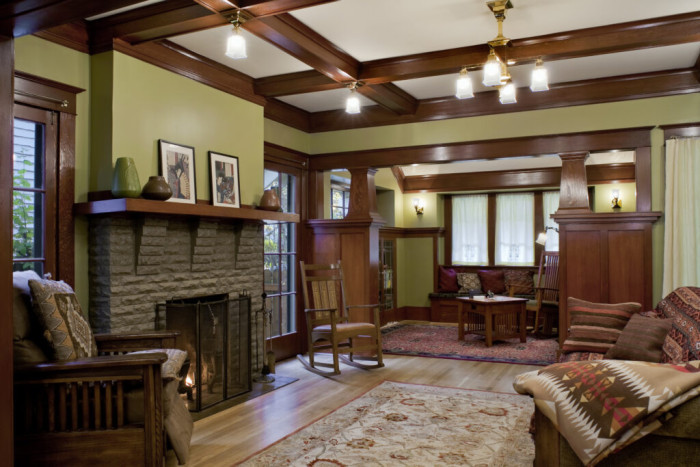 One of the most distinctive features of a Craftsman home is its open floor plan. While the layout promotes a sense of spaciousness, it’s cleverly designed with architectural details that define each space. For instance, living and dining areas are often separated by built-in bookcases or wooden columns, allowing for an open yet cozy feel. This thoughtful approach to design encourages social gatherings and a natural flow throughout the home.
One of the most distinctive features of a Craftsman home is its open floor plan. While the layout promotes a sense of spaciousness, it’s cleverly designed with architectural details that define each space. For instance, living and dining areas are often separated by built-in bookcases or wooden columns, allowing for an open yet cozy feel. This thoughtful approach to design encourages social gatherings and a natural flow throughout the home.
Interior Design Tip: Use bookshelves, console tables, or rugs to help define different spaces within an open floor plan. This will create a sense of separation while still maintaining an open, airy feel. Photo shows a craftsman living room, source: Zillow.
2. Rich Woodwork and Natural Materials
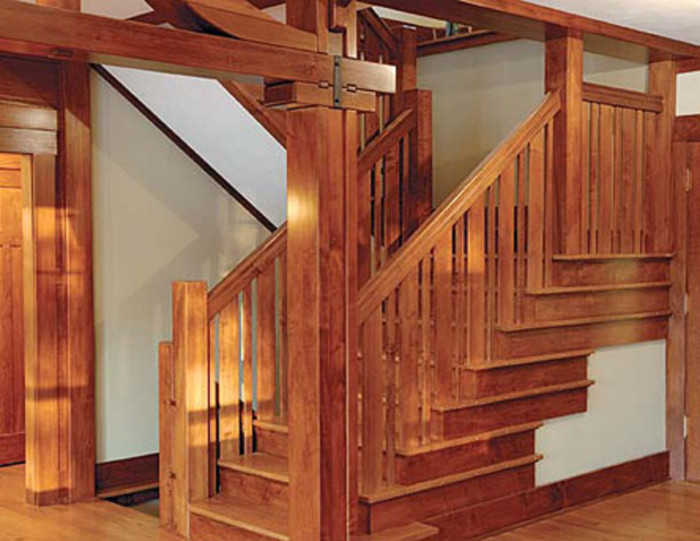 Craftsman interiors are celebrated for their extensive use of rich, natural wood. Oak, mahogany, or fir is typically used for everything from exposed beams and wainscoting to built-in furniture and intricate trim work. This woodwork is often stained rather than painted to showcase the beauty of the grain, lending warmth and a timeless quality to the space. Stone, tile, and other natural materials are also commonly used, especially around fireplaces and in kitchens and bathrooms.
Craftsman interiors are celebrated for their extensive use of rich, natural wood. Oak, mahogany, or fir is typically used for everything from exposed beams and wainscoting to built-in furniture and intricate trim work. This woodwork is often stained rather than painted to showcase the beauty of the grain, lending warmth and a timeless quality to the space. Stone, tile, and other natural materials are also commonly used, especially around fireplaces and in kitchens and bathrooms.
Interior Design Tip: If you don’t have original woodwork in your home, consider adding wood accents, like a stained wood mantel or trim around windows and doors. Even a simple wooden coffee table can bring warmth to your space. The photo shows an amazing craftsman staircase with Mission-Style, source: Pinterest.
3. Built-In Furniture for Beauty and Functionality
Built-ins are a signature element of Craftsman homes. From bookshelves flanking the fireplace to window seats and dining room buffets, built-in-furniture adds both functionality and handcrafted beauty. These custom pieces are perfect for displaying books, art, or cherished heirlooms while making the best use of available space. 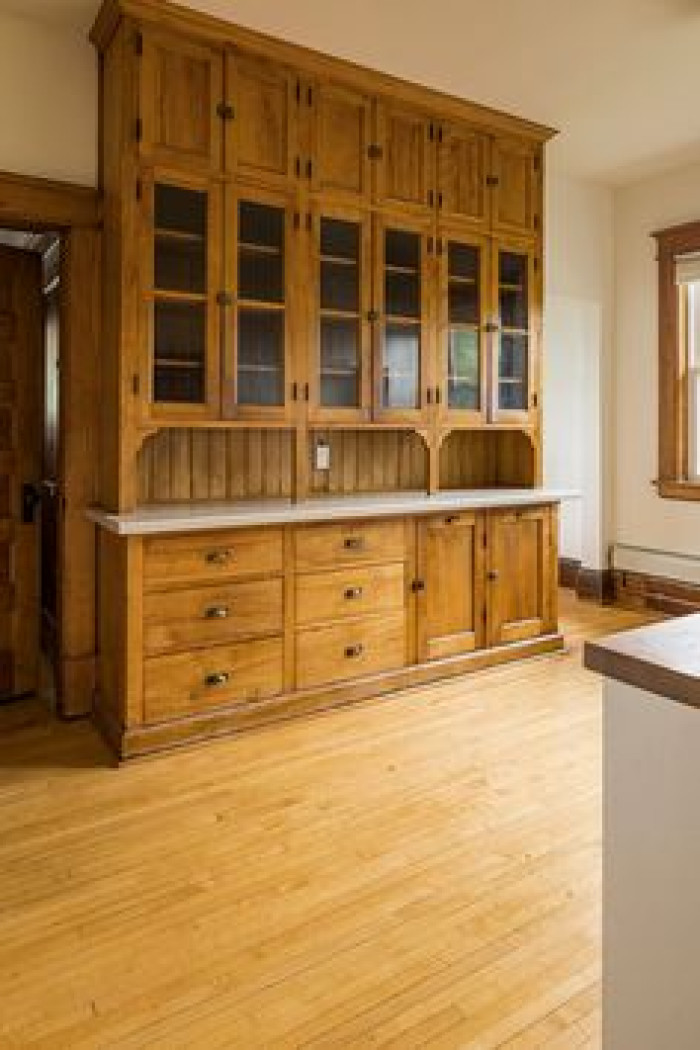
Interior Design Tip: If built-ins aren't an option, mimic the look by adding freestanding bookshelves that match the color of your trim. You can also use storage benches to add both seating and practicality to a room. The photo shows an awesome kitchen built-in, unfortunately, so many of these have been pulled out of homes, source: Pinterest.
4. Earthy Color Palettes for a Cozy Ambiance
The Craftsman style embraces earthy, nature-inspired colors that bring a sense of coziness to any home. Popular shades include warm browns, forest greens, rust, and soft gold. These colors are often paired with neutral, creamy tones on walls and ceilings to create balance. Together, these hues reflect the natural beauty of the surrounding landscape and complement the rich wood elements beautifully.
Interior Design Tip: Incorporate an earthy color palette by using throw pillows, area rugs, or wall art in nature-inspired hues. This is an easy way to add warmth and depth to your home.
5. Handcrafted Details and Classic Hardware
Craftsman design pays special attention to handcrafted details, right down to the hardware. Door knobs, cabinet pulls, and light fixtures are often made of oil-rubbed bronze, wrought iron, or hammered copper, adding an artisanal touch to the home. Lighting fixtures are typically simple yet elegant, including lantern-style sconces and pendant lights with art glass shades that softly diffuse the light.
Interior Design Tip: Update your cabinets or doors with classic hardware in dark metal finishes. This small change can add a touch of Craftsman charm to any room.
6. Fireplaces as the Focal Point
No Craftsman home is complete without a striking fireplace. These fireplaces are often made from natural stone or brick and framed by wood mantels and built-in bookshelves or benches. Tilework around the hearth is another common feature, often in patterns or colors that echo the home’s overall design theme. The fireplace serves as a warm and inviting focal point for family gatherings.
Interior Design Tip: Even if you don’t have a fireplace, create a focal point in your living room with a statement piece of art, a large mirror, or a media console that mimics the look of a mantel.
7. Stained and Leaded Glass for Artistic Details
Stained and leaded glass windows are a stunning element of Craftsman interiors, adding an artistic touch that brings color and light into the home. These windows often feature geometric or nature-inspired designs and are used in cabinets, doors, or as transom windows above main windows. This nod to artistry underscores the movement’s commitment to handmade, beautiful craftsmanship.
Interior Design Tip: Add stained glass elements with simple window clings that mimic the look of real glass. You can also frame a stained glass piece and hang it in front of a window for a similar effect.
8. Simple, Durable Textiles
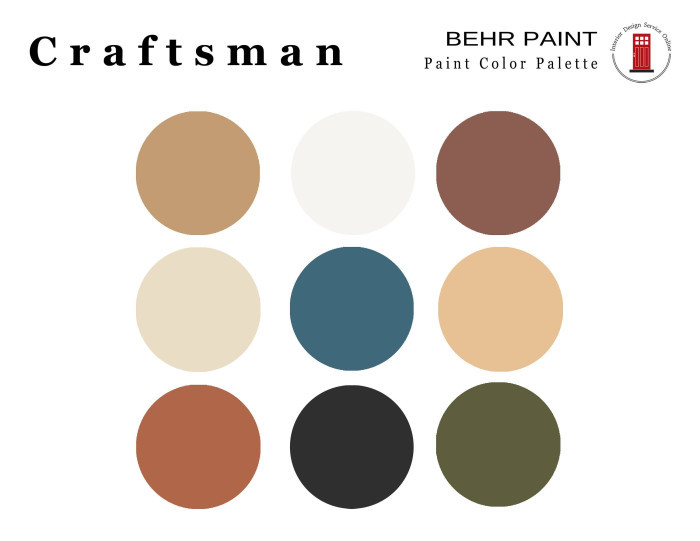 Textiles in Craftsman interiors are straightforward but high quality. Wool rugs, linen curtains, and cotton upholstery in earthy tones or subtle geometric patterns are typical. These fabrics are durable and designed to complement the home’s natural aesthetic, adding warmth and comfort without overpowering the architectural details.
Textiles in Craftsman interiors are straightforward but high quality. Wool rugs, linen curtains, and cotton upholstery in earthy tones or subtle geometric patterns are typical. These fabrics are durable and designed to complement the home’s natural aesthetic, adding warmth and comfort without overpowering the architectural details.
Interior Design Tip: Use natural fiber rugs and simple curtains to bring a Craftsman feel into your space. Stick to neutral tones with subtle patterns for a cohesive look. The photo shows a Craftsman color palette from Behr Paint.
9. Mission-Style and Stickley Furniture
Mission-style furniture, popularized by Gustav Stickley, is a staple in Craftsman homes. Known for its simple lines, visible joinery, and sturdy construction, this furniture is often crafted from oak and paired with leather or natural fabric upholstery. The emphasis is on quality and practicality, ensuring the pieces remain timeless and functional.
Interior Design Tip: Invest in one or two Mission-style pieces, like a sturdy oak chair or a simple wooden dining table. These can serve as focal points and anchor your room in Craftsman style.
10. Balancing Beauty and Practicality
At its heart, Craftsman's interior design is all about striking the perfect balance between beauty and functionality. Every detail, from built-in cabinetry to metal accents, serves a purpose while also adding visual appeal. This commitment to craftsmanship results in homes that feel both artful and comfortable, ideal for everyday living.
Interior Design Tip: Keep your space functional by choosing decor and furniture that serve multiple purposes. Look for stylish storage solutions or versatile pieces that make everyday living easier while still looking great.
Why Craftsman Interior Design is Still Beloved
Craftsman interiors have a timeless appeal that continues to captivate homeowners and designers. With their emphasis on craftsmanship, natural materials, and a warm, welcoming aesthetic, these homes feel both nostalgic and perfectly suited for modern living. Whether you’re a purist or someone who wants to incorporate Craftsman elements into a contemporary space, this design style offers endless inspiration.
Ready to bring Craftsman style into your home? Explore era-inspired furniture and decor at HouseNovel Shop, where we celebrate the timeless beauty of architectural history.

Busting Historic Property Remodel Myths
Have you ever come across an unforgettable run-down historic property you wanted to restore?
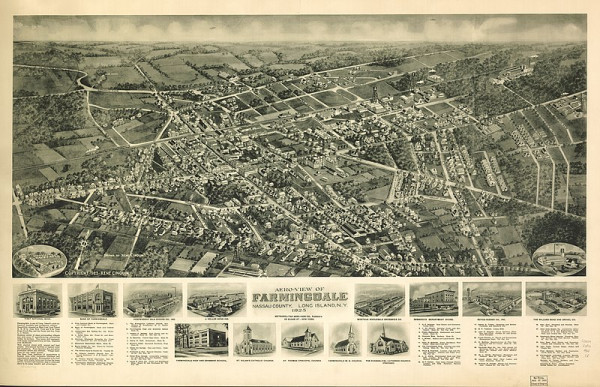
History of Farmingdale New York
Detailing the history of Farmingdale on New York's Long Island
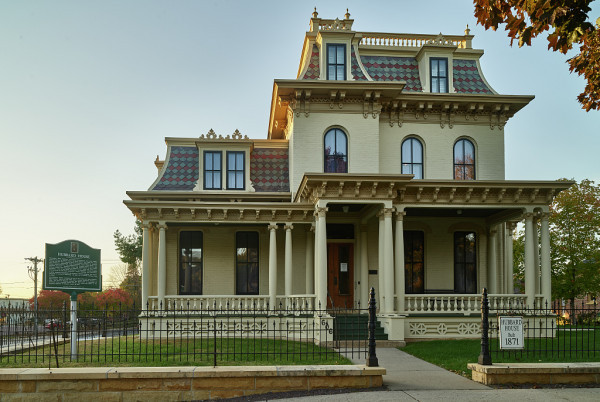
How to register your home on the National Register of Historic Places
Exploring the National Register of Historic Properties, a comprehensive list of significant sites, buildings, structures, and districts throughout the United States that possess historical, architectural, or cultural significance.

House genealogy 101: Discovering home history through census records and property addresses
Utilizing census records and property addresses to learn more about your home's history.
